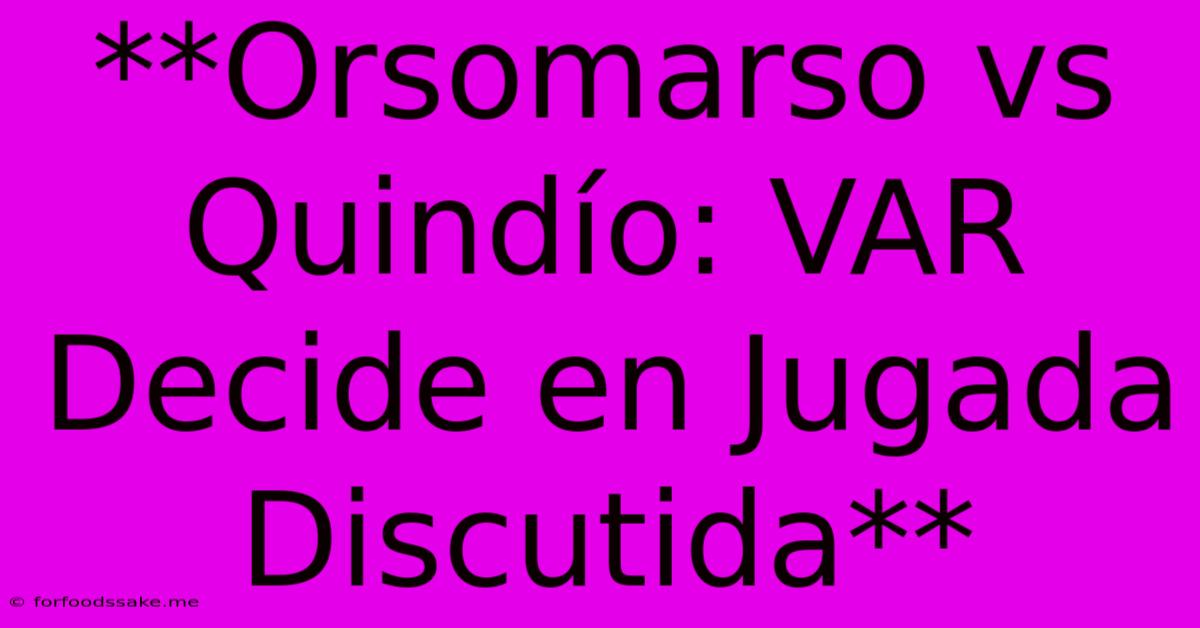**Orsomarso Vs Quindío: VAR Decide En Jugada Discutida**

Discover more detailed and exciting information on our website. Click the link below to start your adventure: Visit Best Website DinnerRecipesz. Don't miss out!
Table of Contents
Orsomarso vs Quindío: VAR Decide en Jugada Discutida
The match between Orsomarso and Quindío in the Colombian Primera B was a tense affair, filled with drama and controversy. The game ultimately ended in a 1-1 draw, with the VAR system playing a crucial role in deciding the outcome.
The Contentious Moment
The turning point of the match came in the 78th minute. Orsomarso's forward, Juan David Rodríguez, found himself in a promising position inside the Quindío penalty area. As he went to shoot, he was challenged by a Quindío defender. The referee initially waved play on, but the VAR intervened, advising him to review the incident.
The replay showed a clear foul by the Quindío defender, who had clipped Rodríguez's heels. This resulted in a penalty kick for Orsomarso. The penalty was successfully converted, giving Orsomarso a 1-0 lead.
Quindío's Response and VAR's Second Intervention
Quindío, shaken by the penalty, responded quickly with a determined attack. Their efforts were rewarded when they managed to equalize in the 85th minute. However, the celebrations were short-lived.
Another controversial incident arose when Quindío's attacking player was deemed to have handled the ball in the penalty area. The referee, after consulting with the VAR, decided to award Orsomarso a second penalty. However, this time, the penalty was missed, leaving the final score at 1-1.
The VAR Debate
The VAR's intervention in this match sparked heated discussions among fans and pundits alike. While some praised the system for ensuring fair play and achieving justice, others criticized its potential to disrupt the natural flow of the game.
The use of VAR continues to be a topic of debate in football, with supporters arguing that it helps eliminate clear errors and opponents arguing that it leads to excessive delays and unnecessary interruptions.
The Takeaway
Despite the controversial moments, the match between Orsomarso and Quindío was a thrilling encounter that showcased the importance of VAR in modern football. The use of this technology will likely continue to be debated, but it's clear that it has become an integral part of the sport, influencing the outcome of matches in ways that were previously unimaginable.

Thank you for visiting our website wich cover about **Orsomarso Vs Quindío: VAR Decide En Jugada Discutida**. We hope the information provided has been useful to you. Feel free to contact us if you have any questions or need further assistance. See you next time and dont miss to bookmark.
Featured Posts
-
Lazio Supera A Cagliari En La Serie A
Nov 05, 2024
-
Futbol En Directo Celta Vs Getafe
Nov 05, 2024
-
Aguilas Se Imponen Al Licey En Juego Suspendido
Nov 05, 2024
-
Ust Talca Charla Por Dia Del Medico Veterinario
Nov 05, 2024
-
Quincy Jones Un Titan De La Musica
Nov 05, 2024
